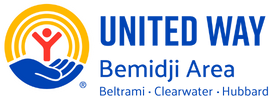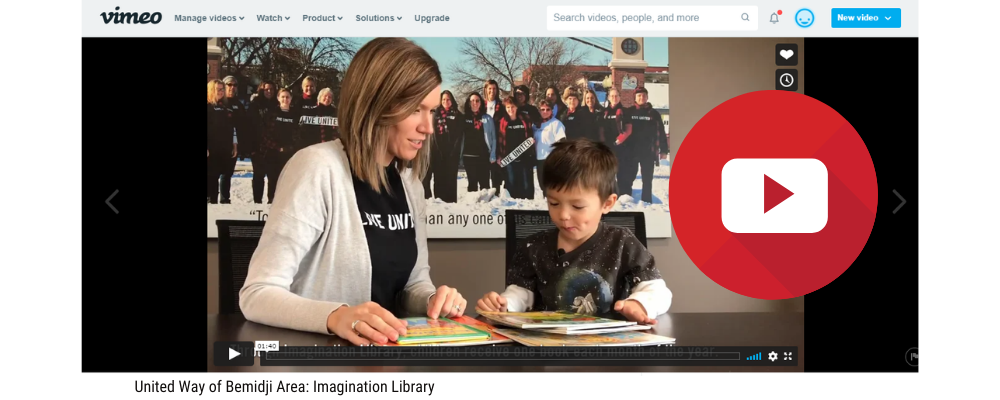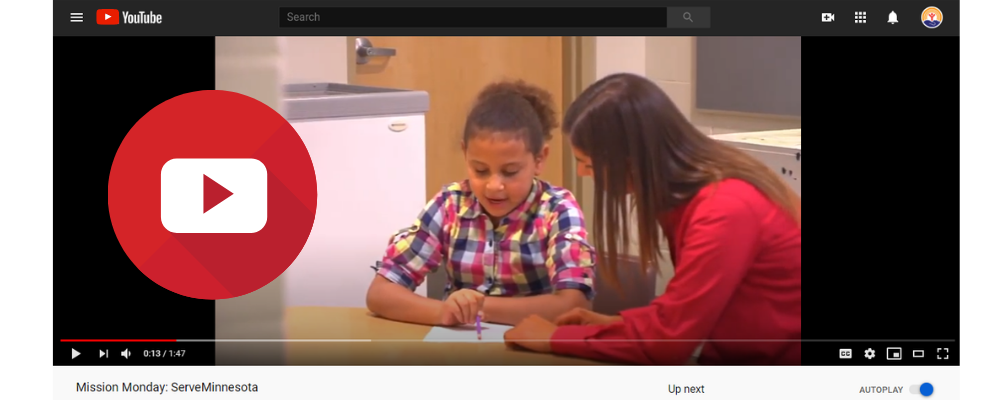

Watch the videos below to learn more about the United Way's work with literacy in our community.
Talk about reading and literacy with your family, business, or other group.
Questions to start off the discussion include:
- What is your favorite childhood picture book?
- Who taught you to read?
- How would not being able to read affect your life today?
- What larger problems are caused by a low reading ability in adults and kids?
- Why do you think reading is important?

Did you know that reading the same book repeatedly is beneficial to children of all ages? Repetition helps to improve speed, increases confidence, and strengthens the connections in the brain that help children learn. This is why book ownership is so important!
Owning books allows children to request their parents read them the same book over and over again.
Choose a picture book to read as a family.
Before reading the book, ask the children to make predictions on what they think will happen based on the title and cover art.
After reading the book, have the children act out the story or draw a picture about the story. Before bed or later in the day, read the book again!
Take a picture with your favorite book and post it to social media using the hashtags: #TurnAPageThursday #BemidjiUnitedInCaring . Make sure you tell us why it’s such a good book!
If you have extra children’s books lying around the house, consider donating them to The Boys and Girls Club of the Bemidji Area. They can always use more books for the kids to read during their learning time.

Share your care by using the hashtag #BemidjiUnitedInCaring on social media.

- The most successful way to improve the reading achievement of low-income children is to increase their access to print. Newman, Sanford, et al. “Americans Child Care Crisis: A Crime Prevention Tragedy”; Fight Crime; Invest in Kids, 2000.
- Cognitive processes develop rapidly in the first few years of life. At birth a baby’s brain is only 25 percent of its adult size. By age three a child’s brain will be 80 percent of its adult size. www.zerotothree.org/child-development/healthy-minds.html
- The developing brain triples in the first year alone and is virtually fully formed by the time a child enters kindergarten. Eliot, L. (1999). What's Going on in There?: How the Brain and Mind Develop in the First Five Years of Life. Bantam Books.
- Given the course of brain development, it is not surprising that young children who are exposed to certain early language and literacy experiences usually prove to be good readers later. Just as a child develops language skills long before being able to speak, the child also develops literacy skills long before being able to read. National Research Council. (1998). Preventing Reading Difficulties in Young Children. Washington, D.C.: National Academy Press.
- The average child from a professional family hears 215,000 words per week; a child from a working-class family hears 125,000 words per week; and a child from a family receiving welfare benefits hears 62,000 words per week. Hart, B. & Risley, T.R. (1995). Meaningful Differences in the Everyday Experience of Young American Children. Baltimore, MD: Brookes Publishing.
- Children growing up in homes with at least 20 books get 3 more years of schooling than children from bookless homes, independent of their parents' education, occupation, and class. Evans, M. D., Kelley, J., Sikora, J., & Treiman, D. J. (2010). Family scholarly culture and educational success: Books and schooling in 27 nations. Research in Social Stratification and Mobility, 28(2), 171-197.




